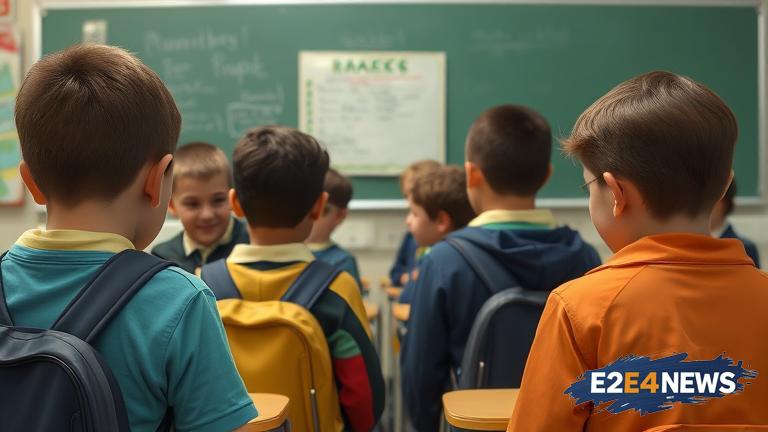A recent report has revealed a disturbing trend in UK schools, where the number of children being suspended for racist behaviour has doubled in just a few years. The data shows that over 15,000 children were suspended from school in the last year alone, with some as young as four being sent home for using discriminatory language or engaging in hate crimes. This surge in suspensions has raised concerns among educators and policymakers, who are struggling to understand the root causes of this behaviour and how to address it effectively. The report highlights the need for schools to take a more proactive approach to teaching diversity, inclusion, and respect for all cultures and backgrounds. Experts believe that the rise in racist behaviour among young children is a symptom of a broader societal problem, where hate speech and discriminatory attitudes are becoming increasingly normalized. The UK government has been criticized for not doing enough to tackle the issue, with some arguing that more needs to be done to support schools and teachers in addressing the problem. The report also notes that the majority of suspensions were for verbal abuse, with many children using racist language or making derogatory comments about their peers. However, there were also cases of physical violence and hate crimes, which are particularly concerning given the young age of the perpetrators. Schools are now being urged to take a more comprehensive approach to addressing racist behaviour, including providing training for teachers and staff, as well as implementing programmes to promote diversity and inclusion. The report also highlights the importance of engaging with parents and the wider community to address the issue, as many children are learning racist attitudes and behaviours from their families and social environments. Furthermore, the report notes that the rise in racist behaviour among young children is not limited to any one region or demographic, but is a widespread problem that affects schools across the UK. The consequences of not addressing this issue are severe, as children who exhibit racist behaviour at a young age are more likely to engage in hate crimes and other forms of discrimination as they get older. Moreover, the report emphasizes the need for schools to create a safe and inclusive environment for all students, regardless of their background or ethnicity. This includes providing support for students who are victims of racist bullying, as well as ensuring that all students feel valued and respected. The UK government has announced plans to increase funding for programmes aimed at promoting diversity and inclusion in schools, but critics argue that more needs to be done to address the root causes of the problem. In addition, the report highlights the importance of addressing the issue of racist behaviour among young children in a holistic and comprehensive way, rather than simply relying on suspensions and other punitive measures. This includes providing children with positive role models and mentors, as well as teaching them about the importance of empathy, respect, and understanding. The report also notes that schools need to be more proactive in identifying and addressing racist behaviour, rather than simply reacting to incidents after they have occurred. By taking a more proactive and comprehensive approach, schools can help to prevent racist behaviour from occurring in the first place, and create a more positive and inclusive environment for all students. Overall, the rise in racist behaviour among young children is a complex and multifaceted issue that requires a comprehensive and sustained response from schools, policymakers, and the wider community. By working together, we can help to create a more inclusive and respectful society, where all children feel valued and supported, regardless of their background or ethnicity.





